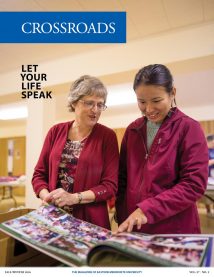
Habecker Mennonite Church’s sewingcircle sings the doxology before enjoying a noon meal. (PHOTOS BY JON STYER)
WHILE MIRIAM CHARLES, 89, quilts over a frame in the basement of Habecker Mennonite Church in Lancaster, Pennsylvania, six fellow congregants make steady progress on simple drawstring bags that will be Mennonite Central Committee school supply and hygiene kits. Say Li works at a nearby sewing machine. Ler Lah, a widower and father to seven children, hooks a drawstring through a wooden dowel needle. Conversation is limited; among the group, only Mya Ray speaks English and is able to interpret. But no matter. Former teacher Rhoda Reinford ’76 Charles, Miriam’s daughter-in-law, moves around the room with quiet instructions, pats on backs and enthusiastic encouragement —“getting my home ec teaching opportunity,“ she jokes.
Mya Ray’s three daughters charge in and out of the Sunday school rooms: Dolly, nearly 8, has numbered the pages of what looks to be a novel (written in English), while sister Grace, 5, colors a wide-eyed pony with a luxurious mane. Two-year-old Florence tries to keep up. In the play area, toddler William, the youngest child of Lu Dee, industriously drops toys through a long cardboard tube held patiently by Rhoda’s husband Jonathan. The Karen women’s husbands are working on this Thursday morning.
Habecker’s history of hosting refugees began in 1946, when Miriam and her husband, Arthur, took in a series of Eastern European families. The church then sponsored several Vietnamese families in 1980. In 2008, the church sponsored a refugee Karen family, who like thousands of others, had escaped the longest-running civil war in the world to live in camps across the Thai and Laos border. (Less than 24 hours before their arrival, housing plans fell through, and Arthur and Miriam Charles offered hospitality.) Since that family, the church, first under Pastor Karen Sensenig and now Pastor Chris and Dawn Landes, has welcomed an increasing number of refugees who have helped to rejuvenate a dwindling congregation.
 “They’ve adopted us as much as we’ve adopted them,” Rhoda Charles says. “It’s totally changed us as a congregation. We’ve formed wonderful friendships.”
“They’ve adopted us as much as we’ve adopted them,” Rhoda Charles says. “It’s totally changed us as a congregation. We’ve formed wonderful friendships.”
Charles was a home economics teacher at Lancaster Mennonite High School for three years after graduating from EMU, where she met Jonathan, who then taught social studies and photography. Their three sons – Nathan, class of ’02, Derrick ’06 and Michael ’09 – are alumni. From 1980 until 2013, they operated an in-home photography business, Charles Studio. This has since transitioned to become Paul Jacobs Photography, run by a long-term employee.
From the first refugee family, the duo have fulfilled many support roles: filling out paperwork, setting up medical appointments, arranging housing, preparing for job interviews, driving children to Mennonite Children Choir practice, speaking with social service workers. Hardly a day goes by without a phone call seeking advice.
Many Karen bring to Habecker a strong Christian faith, which Charles says has changed and deepened her own faith. In her first introduction to the congregation, Mya Ray “stood in front of everyone and said, ‘I am your sister in Christ,’” a moment of intense bonding that Charles remembered later when a nurse asked her how she happened to be in the labor room with her Karen friend. “That was the moment.”
There’s another moment she remembers, when newly arrived Karen sang to the Habecker congregation. “The words were Karen, but the music was unmistakable,” she said. “It was ‘Count Your Blessings.’ Count your blessings, when you’ve just arrived in a new country after years in a refugee camp and your family has suffered so much.”
Charles says that birthday parties she organized for Karen children included games and traditional American cake and ice cream, but she soon learned that her friends wanted to worship first and then share a meal. “God had used this to help me refocus, not that prayer, hospitality and service were values that were foreign to me before, but this has really cemented those.”
Back in the basement, the adults work to a stopping point. Before their lunch of chicken soup and noodles, they sing the doxology – in two languages, speaking the same love in common rhythm.
